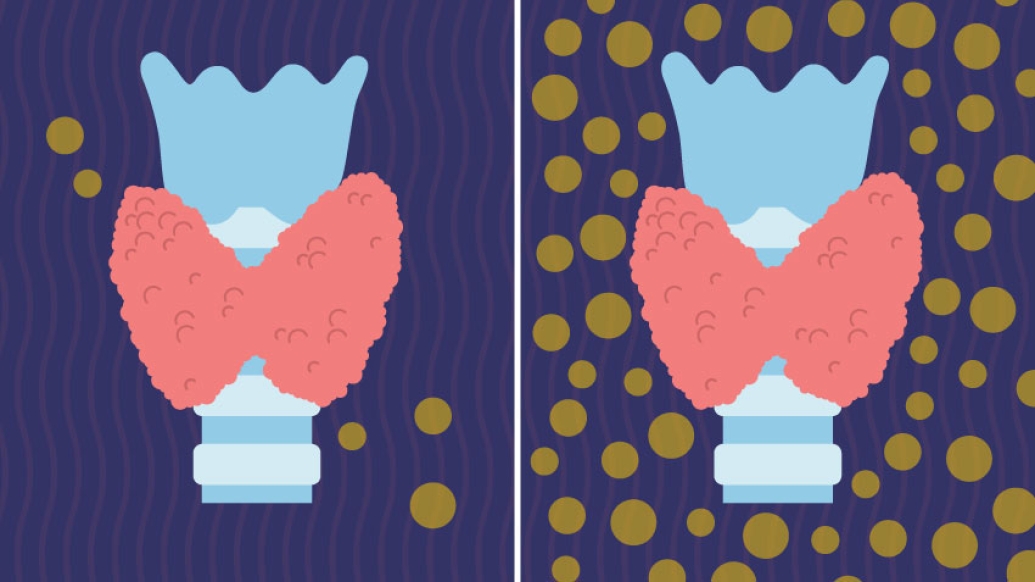More than 20 million Americans have thyroid disease, but 60% don't know it. A Michigan Medicine endocrinologist discusses who's at risk, signs to look for and how to seek treatment.
5:00 AM
Author |

There's a small, butterfly shaped gland in your lower neck, the thyroid, that secretes hormones (T3 and T4) and affects almost every organ in the body, regulating metabolic processes and controlling body temperature.
When the thyroid doesn't produce a normal hormone level, either not enough or too much, thyroid disease occurs. And according to Michigan Medicine endocrinologist Maria Papaleontiou, M.D. it's actually more common than heart disease or diabetes.
An estimated 20 million Americans have some form of thyroid disease, but up to 60% of those that have it are unaware of the condition, according to the American Thyroid Association, with autoimmune diseases like Hashimoto's disease and Graves' disease among the most common culprits of hypothyroidism and hyperthyroidism, respectively.
LISTEN UP: Add the new Michigan Medicine News Break to your Alexa-enabled device, or subscribe to our daily updates on iTunes, Google Play and Stitcher.
If the thyroid hormone levels are too low, referred to as hypothyroidism or underactive thyroid, the brain's pituitary gland will produce more thyroid stimulating hormone (TSH). TSH prompts the thyroid to make more thyroid hormones in response to low levels.
If the thyroid hormone levels are too high, referred to as hyperthyroidism or overactive thyroid, the pituitary will produce less TSH in an attempt to decrease production of active thyroid hormone. The pituitary and thyroid glands work together in an effort to create an internal balance.
Risk factors
Thyroid disease can be up to eight times more likely in women than men, according to Papaleontiou. The reason for this sex difference remains unclear, but it may be in part because autoimmune diseases are more common in women and Hashimoto's disease is the most common cause of hypothyroidism in the United States.
Besides history of an autoimmune disease, Papaleontiou says you're also at greater risk of developing thyroid disease if:
-
You have a family history of thyroid disease.
-
You're older than 60 years old.
-
You've received radiation treatment to the head, neck or chest.
-
You've been pregnant in the past 6 months.
-
You have an iodine deficiency.
-
You eat large amounts of food that contain iodine like kelp, or take medications containing iodine.
Symptoms of thyroid disease
When thyroid levels are too low, cells don't get enough of the thyroid hormones and the body's processes start to slow down. Symptoms of hypothyroidism aren't always apparent but may include:
-
Cold intolerance
-
Fatigue
-
Dry skin
-
Forgetfulness
-
Constipation
-
Depressive mood swings
In contrast, hyperthyroidism causes the body's processes to speed up and functions quicken, leading to symptoms like:
-
Nervousness or anxiety
-
Irritability
-
Increased sweating
-
Increased heart rate or hand tremors
-
Difficulty sleeping
-
Skin thinning
-
Frequent bowel movements
-
Fine, brittle hair
-
Muscle weakness
-
Weight loss
-
Lighter, less frequent menstrual periods
-
Lack of energy and fatigue
"The symptoms can be variable and non-specific, so the only way to definitively diagnose a thyroid condition is with a simple blood test," says Papaleontiou, a member of the University of Michigan Institute for Healthcare Policy & Innovation.
The good news is that once a thyroid condition is identified, it can be successfully treated and patients can resume a healthy lifestyle without restrictions.Maria Papaleontiou, M.D.
Screening and Treatment
A blood draw can determine TSH levels and indicate an over- or underactive thyroid. If the levels are elevated, the test indicates an underactive thyroid.
In hyperthyroidism, high levels of the thyroid hormones T3 and T4 are common along low levels of TSH. If the blood test confirms an overactive thyroid, levels of thyrotropin receptor antibodies may be measured too, which when elevated point to a diagnosis of Graves' disease.
MORE FROM MICHIGAN: Sign up for our weekly newsletter
"Tests to determine the cause of hyperthyroidism may include getting a thyroid scan and measuring the thyroid's ability to collect iodine, which may be done at the same time" says Dr. Papaleontiou.
Fortunately, treatment options for both hypothyroidism and hyperthyroidism exist are usually well-tolerated. According to Papaleontiou, treatment for an underactive thyroid involves replacing the hormones that the thyroid doesn't make with a synthetic hormone, such as Levothyroxine.
Depending on a person's age, the underlying cause of the disease, the severity of hyperthyroidism and other pre-existing medical conditions, several options can treat an overactive thyroid. These include anti-thyroid medications like Methimazole, radioactive iodine treatment or surgery.
"Although most cases of thyroid disease are mild, thyroid hormones are vital to our body because of how they influence how all other bodily cells, tissues and organs function," says Papaleontiou. "The good news is, once a thyroid condition is identified, it can be successfully treated and patients can resume a healthy lifestyle without restrictions."

Explore a variety of health care news & stories by visiting the Health Lab home page for more articles.

Department of Communication at Michigan Medicine
Want top health & research news weekly? Sign up for Health Lab’s newsletters today!





